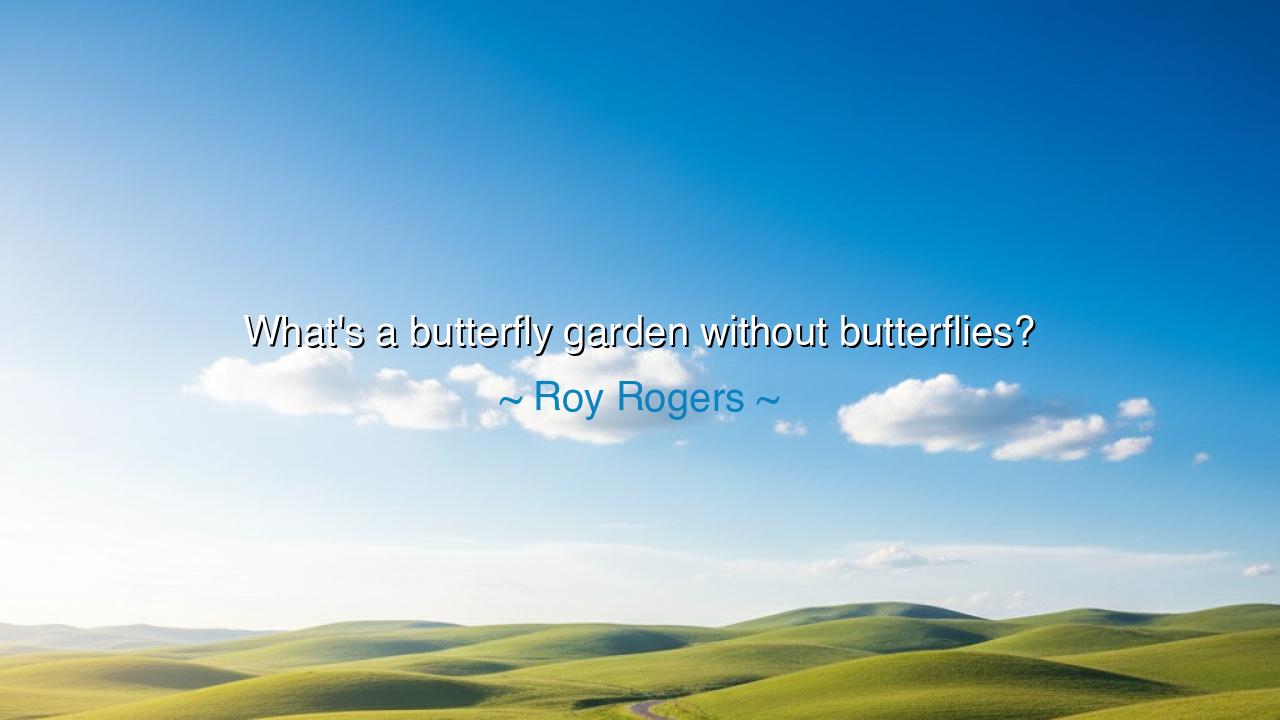
What's a butterfly garden without butterflies?






In the words of Roy Rogers, “What’s a butterfly garden without butterflies?” we find not merely a question, but a riddle for the heart. The garden, rich with flowers, soil, and sun, is yet incomplete if the winged beings it was made for never arrive. The phrase awakens us to a truth as old as the ancients: beauty without purpose, or form without spirit, is but an empty shell. The garden is a vessel, and the butterflies its soul. Without them, the fragrance fades into silence, the blossoms bow in vain, and creation itself feels hollow.
This saying is not bound to gardens alone, but to all things fashioned with hope. What is a temple without prayer? What is a song without a listener? What is a kingdom without its people? The ancients often taught that the visible world is but half of reality; the unseen — the life, the love, the spirit — completes it. Just as the butterfly completes the garden, so does the purpose complete the work of human hands.
Consider the tale of the Parthenon of Athens, built in gleaming marble to honor Athena, the city’s guiding spirit. Yet when invaders pillaged it and worship ceased, it stood only as a hollow monument. Its columns were strong, its carvings still divine, but without devotion, it became merely stone. In the same way, the butterfly garden without butterflies is an altar without flame. The lesson resounds: form is nothing without the life it is meant to host.
On a smaller stage, imagine a man who labors to build a home of perfect measure, carving beams, polishing floors, adorning walls with gold. Yet, if no laughter of children fills the halls, if no warmth of love rests by its hearth, it remains but an ornament to emptiness. The home, like the garden, finds its true essence not in its structure, but in the life that blossoms within it. The butterfly is the living proof that the work was not in vain.
Roy Rogers, a man of both soil and stage, knew this truth. His words were born from a life spent cherishing the simple — the family, the faith, the connection to nature. He understood that the heart yearns not for possessions, but for presence. A garden may be tended with diligence, but it is incomplete until joy dances upon its petals. So too in life: our labor, our dreams, our sacrifices — they are incomplete unless they are met with the beauty of companionship, of meaning, of fulfillment.
Thus, the teaching is clear: when you labor to build, do not seek only the structure but also the soul. Ask yourself, “Where are the butterflies for my garden?” Do not be content with empty triumphs, lifeless wealth, or hollow pursuits. Instead, open your life so that love, joy, and purpose may alight upon it, just as butterflies alight upon flowers.
The lesson for us is practical and urgent. Do not merely build gardens of career, status, or possessions. Build gardens of friendship, of kindness, of service. Invite the butterflies by planting the seeds of compassion, patience, and generosity. When you speak, let it be with sincerity. When you create, let it be for others to share. When you love, let it be deeply, without restraint. For in the end, the worth of the garden lies not in its walls of hedges or fountains of stone, but in the fluttering wings of life that enter and make it whole.
So remember, O traveler of time: tend your garden with care, but more than this, prepare it for the butterflies. For without them, your efforts may stand empty. But with them, your life shall be radiant, a place where beauty and purpose unite, and where the soul can finally rest in joy.






AAdministratorAdministrator
Welcome, honored guests. Please leave a comment, we will respond soon